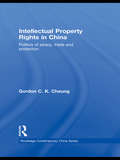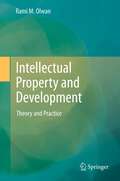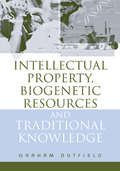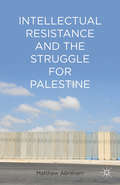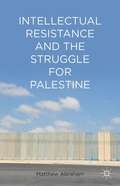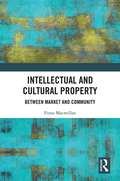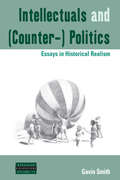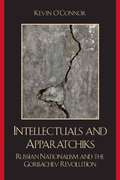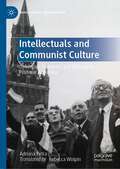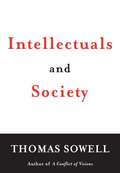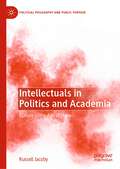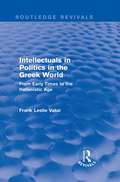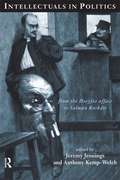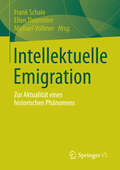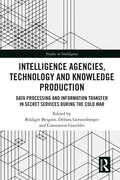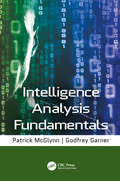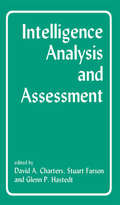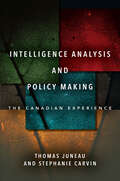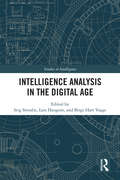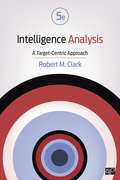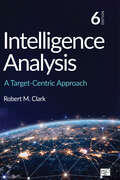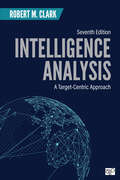- Table View
- List View
Intellectual Property Rights in China: Politics of Piracy, Trade and Protection (Routledge Contemporary China Series)
by Gordon C.K CheungIntellectual Property Rights (IPR) infringement is so rampant in China that counterfeit goods - from general household merchandise, garments and media consumables to specialist products including pharmaceutical products and super computer chips - can be found in roadside stalls, markets, shops, department stores and even laboratory of leading universities. If allowed to continue these infringements may further engender a socially accepted culture of ‘fakeness’ that may seriously hamper innovation and economic progress. Gordon C. K. Cheung uses the case of intellectual property rights (IPR) to examine how and to what extent market forces and knowledge development affect the relationships of China and the world, especially the United States. Including detailed original statistics and data collected from Chinese provinces and cities and in-depth interviews with legal experts and policy makers, this book gives a unique insight into the opportunities and challenges that China faces as it increasingly becomes part of the global society. Intellectual Property Rights in China is a stimulating read for anyone studying Chinese Business and International Political Economy.
Intellectual Property and Development
by Rami M. OlwanThe book examines the correlation between Intellectual Property Law - notably copyright - on the one hand and social and economic development on the other. The main focus of the initial overview is on historical, legal, economic and cultural aspects. Building on that, the work subsequently investigates how intellectual property systems have to be designed in order to foster social and economic growth in developing countries and puts forward theoretical and practical solutions that should be considered and implemented by policy makers, legal experts and the Word Intellectual Property Organization (WIPO).
Intellectual Property, Biogenetic Resources and Traditional Knowledge
by Graham DutfieldBiogenetic resources - the critical biological and chemical materials that underpin so much of medicine, both modern and traditional, agriculture, and wider economic activity in so many fields - are at the centre of heated debate regarding their use, development, and ownership, and the issues of ethics and equity that impinge on all of these factors. This book is a comprehensive examination of the key issues, institutions and ideologies in this area, presenting definitions and explanations of the fundamentals of intellectual property rights (IPRs), biogenetic resources and traditional knowledge. It uses the insights from this to build a picture of how these factors interact in practice, bringing to the surface issues such as: the conservation and sustainable use of biodiversity, benefit sharing from the commercial use of biodiversity, biotechnological innovation and the transfer of technology, agriculture, food security, rural development, health and international justice. Part 1 describes the relevant international IPR laws, highlights the extent to which modern commerce depends on such resources, and traces the way in which modern IPR law has evolved to accommodate this dependence. Part 2 shows how stronger IPR protection in the area of life science innovation has given rise to controversies such as 'biopiracy', 'terminator' genes and genetic uniformity. Part 3 focuses on traditional knowledge, its nature, its importance, and the applicability of IPR-style protection. Part 4 covers the international negotiation and policy-making of the WTO, WIPO and CBD and the legislative initiatives of national governments of Asia, Africa and Latin America. Finally, Part 5 focuses on two developing country case studies - of India and Kenya - assessing whether they will be able to gain economic benefit from development of their natural resources within the current regulatory system and whether this will encourage the conservation and sustainable use of the resource base. With its multidisciplinary approach and breadth of coverage, this book will appeal both to those new to the subject and to those with professional and specialist interest, including students, academics, legal practitioners, government policy-makers and the private sector.
Intellectual Resistance and the Struggle for Palestine
by M. AbrahamBy positioning the late Edward Said's political interventions as a public intellectual on behalf of Palestinian populations living under Israeli occupation as a form of intellectual resistance, Abraham moves to consider forms of physical resistance, seeking to better understand the motivations of those who choose to turn their bodies into weapons.
Intellectual Resistance and the Struggle for Palestine
by Matthew AbrahamIntellectual Resistance and the Struggle for Palestine.
Intellectual and Cultural Property: Between Market and Community
by Fiona MacmillanThis book focuses on the fraught relationship between cultural heritage and intellectual property, in their common concern with the creative arts. The competing discourses in international legal instruments around copyright and intangible cultural heritage are the most obvious manifestation of this troubled encounter. However, this characterization of the relationship between intellectual and cultural property is in itself problematic, not least because it reflects a fossilized concept of heritage, divided between things that are fixed and moveable, tangible and intangible. Instead the book maintains that heritage should be conceived as part of a dynamic and mutually constitutive process of community formation. It argues, therefore, for a critically important distinction between the fundamentally different concepts of not only intellectual and cultural heritage/property, but also of the market and the community. For while copyright as a private property right locates all relationships in the context of the market, the context of cultural heritage relationships is the community, of which the market forms a part but does not – and, indeed, should not – control the whole. The concept of cultural property/heritage, then, is a way of resisting the reduction of everything to its value in the market, a way of resisting the commodification, and creeping propertization, of everything. And, as such, the book proposes an alternative basis for expressing and controlling value according to the norms and identity of a community, and not according to the market value of private property rights. An important and original intervention, this book will appeal to academics and practitioners in both intellectual property and the arts, as well as legal and cultural theorists with interests in this area.
Intellectuals and (Counter-) Politics: Essays in Historical Realism
by Gavin SmithContemporary forms of capitalism and the state require close analytic attention to reveal the conditions of possibility for effective counter-politics. On the other hand the practice of collective politics needs to be studied through historical ethnography if we are to understand what might make people's actions effective. This book suggests a research agenda designed to maximize the political leverage of ordinary people faced with ever more remote states and technologies that make capitalism increasingly rapacious. Gavin Smith opens and closes this series of interlinked essays by proposing a concise framework for untangling what he calls "the society of capital" and subsequently a potentially controversial way of seeing its contemporary features. This book tackles the political conundrums of our times and asks what roles intellectuals might play therein.
Intellectuals and Apparatchiks: Russian Nationalism and the Gorbachev Revolution
by Kevin O'ConnorThis book traces the origins and activities of an alliance of conservative Communist Party authorities and Russian nationalists during the late Soviet era. Specifically, it examines how and to what extent hitherto orthodox Communists sought political allies in the Russian nationalist movement in order to garner support for halting the reform program and saving the Soviet state from collapse. Focusing on the perestroika period, Dr. Kevin O'Connor explains in detail how Marxism-Leninsim receded into irrelevance, forcing orthodox Communists to abandon their Marxist principles in favor of great Russian nationalism.
Intellectuals and Communist Culture: Itineraries, Problems, and Debates in Post-war Argentina (Marx, Engels, and Marxisms)
by Adriana PetraThis book investigates a central chapter in the history of 20th century intellectualism: the commitment to the communist ideal and the Soviet Union. Focusing on Argentina, whose communist party was among the most important in Latin America, Petra engages with the current literature on Western communism in order to conduct an exhaustive study of the intellectuals, cultural organizations, publications, and debates within Argentine communism in the decades following World War II. Based on rigorous archival research from diverse sources, Petra’s book distances itself from existing teleological visions and institutional approaches to the communist world, offering instead a complex framework in which multiple contexts, scales, and actors frame the larger problem: the intellectual commitment to a political project that brooked no dissent. Intellectuals and Communist Culture also addresses the emergence of Peronism, a crucial movement in Argentine political life to this very day, thus offering an important chapter on Latin American political and intellectual history and an invaluable contribution to the global history of the international communist movement.
Intellectuals and Society
by Thomas SowellSowell (Hoover Institution, Stanford U. ) issues a right-wing jeremiad against the intelligentsia, the membership of which seems to primarily consist of academics, writers, etc. whose views he finds distasteful. If there is a core argument to the work, it is that intellect does not equal wisdom, that the ideas of intellectuals are not subjected to empirical verifiability, and that intellectuals wield an outsized influence on society that often leads to harmful outcomes (less so, he notes gratefully, in the United States than in Europe, although it is telling that he places the high point of US intellectuals' influence as being in the 1960s and 1970s, an era of greater left influence than later decades). However, this core argument appears to be less of a thesis to be proved than a hook upon which to hang a litany of complaints against ideas that he disagrees with in the realms of economics, social visions, the law, and war. With regards to these complaints, Sowell is frequently less than convincing, as he rarely treats the ideas of his opponents with even a semblance of seriousness. On the very first page, for instance, he argues that Marx's idea that labor is the source of all wealth is disproved because, "if this were true, countries with much labor and little technology or entrepreneurship would be more prosperous than countries with the reverse, when in fact it is blatantly obvious that the direct opposite is the case. " This is such a laughably ridiculous distortion of Marx's theory of labor value that is hard to imagine that any thoughtful reader could possibly take it, or most of the rest of Sowell's similarly-styled arguments, seriously. Those on the right who merely want their political beliefs reinforced may find the work enjoyable however. Annotation ©2011 Book News, Inc. , Portland, OR (booknews. com)
Intellectuals and the Search for National Identity in Twentieth-Century Brazil
by Ronald H. ChilcoteThis book discusses twentieth-century Brazilian political thought, arguing that while Rio de Janeiro intellectuals envisaged the state and the national bourgeoisie as the means to overcome dependency on foreign ideas and culture, São Paulo intellectuals looked to civil society and the establishment of new academic institutions in the search for national identity. Ronald H. Chilcote begins his study by outlining Brazilian intellectuals' attempt to transcend a sense of inferiority emanating from Brazilian colonialism and backwardness. Next, he traces the struggle for national identity in Rio de Janeiro through an account of how intellectuals of varying political persuasions united in search of a political ideology of national development. He then presents an analysis by São Paulo intellectuals on racial discrimination, social inequality, and class differentiation under early capitalism and industrialization. Lastly, the book concludes with a discussion on how Brazilian intellectuals challenged foreign thinking about development through the state and representative democratic institutions, in contrast to popular and participatory democratic practices.
Intellectuals in Politics and Academia: Culture in the Age of Hype (Political Philosophy and Public Purpose)
by Russell JacobyThis book addresses the fate of intellectuals in modern culture and politics. Russell Jacoby’s seminal The Last Intellectuals: American Culture in the Age of Academe (1987, 2000) introduced the term “public intellectual” and gave rise to heated controversy. Here Jacoby assesses contemporary public intellectuals, their profound failings and limited achievements. The book includes biting appraisals of well-known intellectuals, such as Noam Chomsky, Hannah Arendt, and Bernard-Henri Lévy, as well as interventions on violence, utopia and multiculturalism.
Intellectuals in Politics in the Greek World: From Early Times to the Hellenistic Age (Routledge Revivals)
by Frank VataiIntellectuals in Politics in the Greek World, first published in 1984, was the first comprehensive study of this recurrent theme in political sociology with specific reference to antiquity, and led to significant revaluation of the role of intellectuals in everyday political life. The term ‘intellectual’ is carefully defined, and figures as diverse as Pythagoras, Plato and Aristotle; Isocrates, Heracleides of Ponteius and Clearchus of Soli are discussed. The author examines the difference between the success of an intellectual politician, like Solon, and the failure of those such as Plato who attempted to mould society to abstract ideals. It is concluded that, ultimately, most philosophers were conspicuously unsuccessful when they intervened in politics: citizens regarded them as propagandists for their rulers, while rulers treated them as intellectual ornaments. The result was that many thinkers retreated to inter-scholastic disputation where the political objects of discussion increasingly became far removed from contemporary reality.
Intellectuals in Politics: From the Dreyfus Affair to Salman Rushdie
by Jeremy Jennings Anthony Kemp-WelchAfter an introduction to the major issues confronting intellectuals, this book explores the various aspects of the intellectual's role including:* philosophers and academics who have tried to define the function of the intellectual* how intellectuals have assumed the status of the conscience of the nation and the voice of the oppressed* the interaction of intellectuals with Marxism* the place of the intellectual in American societyCovering regions as diverse as Israel, Algeria, Britain, Ireland, central Europe and America, this collection considers the question of whether the intellectual can still lay claim to the language of truth. In answering, this study tells us much about the modern world in which we live.Coverage includes the following thinkers: Gramsci, Weber, Yeats, Auden, Levy, Mailer, Walzer, Marx and many more.
Intellektuelle Emigration
by Frank Schale Michael Vollmer Ellen ThümmlerEine Intellektuellengeschichte des 20. Jahrhunderts muss die geistigen Einflüsse deutscher Wissenschaftsemigranten zwischen 1933 und 1945 berücksichtigen. Zu einschneidend prägte sie das literarische, kulturelle und politische Denken diesseits und jenseits des Atlantiks. Aus einem breiten Verständnis von Ideengeschichte heraus werden nicht nur prominente Emigranten wie Hannah Arendt, Arnold Bergstraesser und Franz L. Neumann, sondern zugleich dem drohenden Vergessen anheim fallende Flüchtlinge wie Sigmund Neumann, Ferdinand Hermens und Otto Neurath oder bisher kaum beachtete Biographien von André Gorz und Romain Rolland vorgestellt. Einerseits rekonstruieren die Beiträge die dramatischen Lebenslinien sowie die oft unter beklemmenden Bedingungen angefertigten politischen, gesellschafts-, kultur- und wissenschaftstheoretischen Arbeiten. Andererseits wagen sie auch einen Blick auf die Perspektiven der Emigrationsforschung heute.
Intelligence Agencies, Technology and Knowledge Production: Data Processing and Information Transfer in Secret Services during the Cold War (Studies in Intelligence)
by Constantin Goschler Rüdiger Bergien Debora GerstenbergerThis volume examines intelligence services since 1945 in their role as knowledge producers. Intelligence agencies are producers and providers of arcane information. However, little is known about the social, cultural and material dimensions of their knowledge production, processing and distribution. This volume starts from the assumption that during the Cold War, these core activities of information services underwent decisive changes, of which scientization and computerisation are essential. With a focus on the emerging alliances between intelligence agencies, science and (computer) technology, the chapters empirically explore these transformations and are characterised by innovative combinations of intelligence history with theoretical considerations from the history of science and technology and the history of knowledge. At the same time, the book challenges the bipolarity of Cold War history in general and of intelligence history in particular in favour of comparative and transnational perspectives. The focus is not only the Soviet Union and the United States, but also Poland, Turkey, the two German states and Brazil. This approach reveals surprising commonalities across systems: time and again, the expansion and use of intelligence knowledge came up against the limits that resulted from intelligence culture itself. The book enriches our global understanding of knowledge of the state and contributes to a historical framework for the past decade of debates about the societal consequences of intelligence data processing. This book will be of much interest to students of intelligence studies, science and technology studies, security studies and International Relations.
Intelligence Analysis Fundamentals
by Godfrey Garner Patrick McGlynnThere are a limited number of intelligence analysis books available on the market. Intelligence Analysis Fundamentals is an introductory, accessible text for college level undergraduate and graduate level courses. While the principles outlined in the book largely follow military intelligence terminology and practice, concepts are presented to correlate with intelligence gathering and analysis performed in law enforcement, homeland security, and corporate and business security roles. Most of the existing texts on intelligence gathering and analysis focus on specific types of intelligence such as ‘target centric’ intelligence, and many of these, detail information from a position of prior knowledge. In other words, they are most valuable to the consumer who has a working-level knowledge of the subject. The book is general enough in nature that a lay student—interested in pursuing a career in intelligence, Homeland Security, or other related areas of law enforcement—will benefit from it. No prior knowledge of intelligence analysis, functions, or operations is assumed. Chapters illustrate methods and techniques that, over the years, have consistently demonstrate results, superior to those achieved with other means. Chapters describe such analytical methods that are most widely used in the intelligence community and serve as recognized standards and benchmarks in the practice of intelligence analysis. All techniques have been selected for inclusion for their specific application to homeland security, criminal investigations, and intelligence operations. Uses numerous hands-on activities—that can easily be modified by instructors to be more or less challenging depending on the course level—to reinforce concepts As current and active members of the intelligence community, the authors draw on their decades of experience in intelligence to offer real-world examples to illustrate concepts All methodologies reflect the latest trends in the intelligence communities assessment, analysis, and reporting processes with all presented being open source, non-classified information As such, the non-sensitive information presented is appropriate—and methods applicable—for use for education and training overseas and internationally Military-style collection and analysis methods are the primary ones presented, but all are directly correlated intelligence to current concepts, functions and practices within Homeland Security and the law communities Covers the counterterrorism environment where joint operations and investigative efforts combine military, private sector, and law enforcement action and information sharing The book will be a welcome addition to the body of literature available and a widely used reference for professionals and students alike.
Intelligence Analysis and Assessment (Studies in Intelligence)
by David A. Charters Glenn P. Hastedt A. Stuart FarsonThese essays cover: assessment systems now in place in Britain, the USA, Germany and Australia; the bureaucratic dynamics of analysis and assessment; the changing ground in intelligence; and the impact of new technologies and modes of communication on intelligence gathering and analysis.
Intelligence Analysis and Policy Making: The Canadian Experience
by Stephanie Carvin Thomas JuneauCanada is a key member of the world's most important international intelligence-sharing partnership, the Five Eyes, along with the US, the UK, New Zealand, and Australia. Until now, few scholars have looked beyond the US to study how effectively intelligence analysts support policy makers, who rely on timely, forward-thinking insights to shape high-level foreign, national security, and defense policy. Intelligence Analysis and Policy Making provides the first in-depth look at the relationship between intelligence and policy in Canada. Thomas Juneau and Stephanie Carvin, both former analysts in the Canadian national security sector, conducted seventy in-depth interviews with serving and retired policy and intelligence practitioners, at a time when Canada's intelligence community underwent sweeping institutional changes. Juneau and Carvin provide critical recommendations for improving intelligence performance in supporting policy—with implications for other countries that, like Canada, are not superpowers but small or mid-sized countries in need of intelligence that supports their unique interests.
Intelligence Analysis in the Digital Age (Studies in Intelligence)
by Stig Stenslie; Lars Haugom; Brigt Harr VaageThis book examines intelligence analysis in the digital age and demonstrates how intelligence has entered a new era. While intelligence is an ancient activity, the digital age is a relatively new phenomenon. This volume uses the concept of the "digital age" to highlight the increased change, complexity, and pace of information that is now circulated, as new technology has reduced the time it takes to spread news to almost nothing. These factors mean that decision-makers face an increasingly challenging threat environment, which in turn increases the demand for timely, relevant, and reliable intelligence to support policymaking. In this context, the book demonstrates that intelligence places greater demands on analysis work, as the traditional intelligence cycle is no longer adequate as a process description. In the digital age, it is not enough to accumulate as much information as possible to gain a better understanding of the world. To meet customers’ needs, the intelligence process must be centred around the analysis work – which in turn has increased the demand for analysts. Assessments, not least predictions, are now just as important as revealing someone else’s secrets. This volume will be of much interest to students of intelligence studies, security studies, and international relations.
Intelligence Analysis: A Target-Centric Approach
by Robert M. ClarkRobert M. Clark’s Intelligence Analysis: A Target-Centric Approach demonstrates that a collaborative, target-centric approach leads to sharper and more effective analysis, while better meeting the needs of the customer. Thoroughly revised to reflect the changes in the constantly shifting landscape of intelligence, the Fifth Edition contains a new chapter that frames the nature of intelligence in 21st century conflict. The book also accounts for recent events such as the rise of ISIL and the conflict in Ukraine, and contains new examples throughout. Clark’s practical information and insider perspective create the perfect resource for students and practitioners alike.
Intelligence Analysis: A Target-Centric Approach
by Robert M. ClarkRobert M. Clark’s Intelligence Analysis: A Target-Centric Approach demonstrates that a collaborative, target-centric approach leads to sharper and more effective analysis, while better meeting the needs of the customer. Thoroughly revised to reflect the changes in the constantly shifting landscape of intelligence, the Fifth Edition contains a new chapter that frames the nature of intelligence in 21st century conflict. The book also accounts for recent events such as the rise of ISIL and the conflict in Ukraine, and contains new examples throughout. Clark’s practical information and insider perspective create the perfect resource for students and practitioners alike.
Intelligence Analysis: A Target-Centric Approach
by Robert M. ClarkNow in its Sixth Edition, Robert M. Clark's Intelligence Analysis: A Target-Centric Approach once again delivers a consistent, clear method for teaching intelligence analysis—demonstrating how a collaborative, target-centric approach leads to sharper and more effective analysis. This bestseller also includes new end-of-chapter questions to spark classroom discussion, as well as material on the intelligence cycle, collection, managing analysis, and dealing with intelligence customers. Clark’s practical approach combined with his insider perspective create the ideal resource for students and practitioners alike.
Intelligence Analysis: A Target-Centric Approach
by Robert M. ClarkNow in its Sixth Edition, Robert M. Clark's Intelligence Analysis: A Target-Centric Approach once again delivers a consistent, clear method for teaching intelligence analysis—demonstrating how a collaborative, target-centric approach leads to sharper and more effective analysis. This bestseller also includes new end-of-chapter questions to spark classroom discussion, as well as material on the intelligence cycle, collection, managing analysis, and dealing with intelligence customers. Clark’s practical approach combined with his insider perspective create the ideal resource for students and practitioners alike.
Intelligence Analysis: A Target-Centric Approach
by Robert M. ClarkNow in its Seventh Edition, Robert M. Clark′s Intelligence Analysis: A Target-Centric Approach once again delivers a consistent, clear method for teaching intelligence analysis, demonstrating how a collaborative, target-centric approach leads to sharper and more effective analysis. In addition to looking at the intelligence cycle, collection, managing analysis, and dealing with intelligence customers, the author also examines key advances and emerging fields like prescriptive intelligence. Through features like end-of-chapter questions to spark classroom discussion, this text combines a practical approach to modeling with an insider perspective to serve as an ideal and insightful resource for students as well as practitioners.
